CIA Sponsored Terror, Civil Liberties, Criminalizing Dissent, Crony Capitalism, Gaza, Human Rights, Iraq War, NSA Spying, Political Prisoner, Surveillance, Targeting Muslims, Torture
Podcast: Play in new window | Download
Updates:
- Michael Ratner Updates On Julian Assange Case: You Can’t Just Keep A Case Going In Custody Essentially In The Embassy
- Julian Assange’s Case Could Go To European Court of Human Rights – Assange Is Being Arbitrarily Detained And Investigation Not Proceeding
- Eight Million Documents On Wikileaks In Highly Searchable Format
- Google Turns Over Wikileak Attorney Client Emails to U.S. Government.
- Federal Judge Denies EPIC’s FOIA Request On Government Surveillance Of Wikileaks Reporters – Denied Under Continuing Investigation Exemption
—–
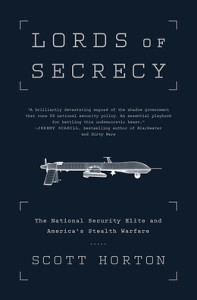

Lords of Secrecy:The National Security Elite and America’s Stealth Warfare
Nearly half a century ago a majority of Americans were concerned whether their country would go to war. It was a time when national debates and public discussions engaged America’s political consciousness. That’s not the case so much these days says our guest author and attorney Scott Horton. His recently published book Lords of Secrecy:The National Security Elite and America’s Stealth Warfare examines how secrecy within the United States government has corrupted fundamental systems of democracy. Scott Horton also surveys the legal authority that the current national security elite have based decisions to torture, wage war and subcontract private soldiers. When operating in secret, mistakes, excesses and crimes committed in the process are often kept quiet.
Attorney Scott Horton:
- Dick Cheney one of the longest serving secretaries of defense, because he had a peculiar atitude about secrecy. He manipulated the news secrecy all the time to give cover to claims and statements he made that turned out not to be true. These claims very frequently matters of the highest consequence.
- The entire case to go to war in Iraq which was in fact led by Dick Cheney rested on claims that they had weapons of mass destruction and that they had aligned themselves and were operating with Al-Qaeda that’s how we got the connection to 911. Those claims were very aggressively put forward by Dick Cheney. They turned out to be completely false. He parried any attempts to challenge them by saying all the intelligence we have on that is . . . secret, so I can’t share it with you.
- Of course, in good time we learned there wasn’t any intelligence or information that supported these claims.
- The lords of secrecy consist of the higher echelon officers of the national intelligence and security bureaucracy and they’re the people who have under American law, the power to create secrets using the classification authority.
- I make the case that they use that power very aggressively, very effectively to make themselves the ultimate decision makers on key national security issues and to remove those matters from the democratic, political process.
- It’s on the lords of secrecy who really influence the final decision when its made by the executive.
- The lords of secrecy, the people who wield the classification power also are part of a revolving door in Washington. They’re in government service, they leave that, they go to work as directors and senior officers of major contractors.
- Those contractors hold a half trillion dollars in contract business every year paid for by tax payers and they also make enormous campaign donations.
- Washington D.C. has emerged as the wealthiest standard metropolitan statistical area in the United States and that’s on the strength of the position of contractors and their ability to suck our treasury dry.
- What the American people don’t know about, they don’t form opinions about. They don’t conjutate about, they don’t become engaged with. That shows how secrecy and this other stuff are a very potent narcotic against democracy effectively, causing democracy to fade away while the national security elites are at the driver’s wheel making all the key decisions.
- I think it allows us to make war without going through the constitutional process.
- It’s really vague on how this go-to-war decision is supposed to be made. There’s the appropriation authority of Congress, there’s the Commander in Chief power of the executive, there’s the power to declare war, and exactly how those rights and powers play out in any given situation really isn’t clear.
- The bottom line is the US waging war overseas without the people of the United States having taken a decision to do so.
- My book has gotten much stronger attention in Europe than it has in the United States.
- A big part of the problem we have is the way national security and particularly intelligence community matters are reported in the United States.
- One thing I looked at the coverage of the drone war in Pakistan and I found very clearly Americans are actually the most poorly informed community globally on this issue.
- The media can’t really act without the whistleblower. It really comes down to the whistleblower being the last and best hope.
- The problem is national security whistleblowers don’t get a fair trial. They wind up being abused, mistreated.
- Let the Justice Department explain why they decided that Petraeus a slap on the fingers, nothing too serious, while they want to throw the book at Snowden.
- Let them give the rationale for the distinction between these cases. They’ve never done that.
Guest – Scott Horton, human rights lawyer and contributing editor to Harper’s Magazine. Scott’s column – No Comment. He graduated Texas Law School in Austin with a JD and was a partner in a large New York law firm, Patterson Belknap Webb & Tyler. His new book Lords of Secrecy The National Security Elite and America’s Stealth Foreign Policy.
—–
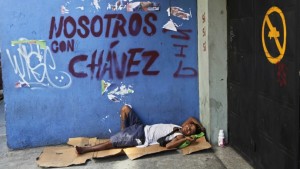
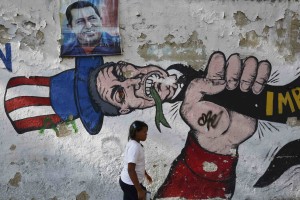
US Sanctions Against Maduro Government Officials
In its continuation of a decades long overthrow of the Venezuelan government, the United States issued new sanctions against Venezuelan government officials who the United States claims are involved in violating human rights guarantees. President Barack Obama issued an order declaring a national emergency with respect to Venezuela. The order lists certain key Venezuelan officials and said that any financial transactions with those officials are barred. This is typical of what the United States does to officials of government it doesn’t like, whether it was Nicaragua in the ’80s or Cuba since 1959 or 1960. These sanctions must also be seen the light of short-lived 2002 military coup in Venezuela in which the United States was deeply involved. Today we want to talk about the broader context of these actions and why the U.S. is continually trying to destabilize Venezuela.
Mark Weisbrot:
- It is pretty crazy that they have to declare Venezuela as an extraordinary threat.
- You don’t see any of the reporters asking the Whitehouse . . . what are you talking about?
- If you look at the Community of Latin American and Caribbean States for example, that is the alternative to the OAS, that was created a few years ago in response to US unpleasant actions in the hemisphere.
- Between 2000-2010 the Columbian military over 5700 innocent civilians, murdered them, and the United States just gave them more military aid.
- I was there during the protest a year ago, and of course it was very different from what I saw . . I was actually kinda shocked. I walked all over and took the metro all over Caracas and the only demonstration you saw were little uprisings in the richest neighborhoods.
- The people most affected the shortages, the ones that go and have to wait in line, can’t afford to buy anything in the black market.
- The poor and the working people, they haven’t protest because they mostly support the government.
- That’s a little bit of a disconnect from what you see in the press.
- This idea that the protests are related to the shortages doesn’t hold up when you see who’s actually protesting. These people have servants who do their shopping, wait in the lines.
- Upper middle class, they have servants, they have storage space.
- These sanctions are probably illegal under International Law.
- Again, there are things that are questionable, things that I wouldn’t try to defend but to create this picture, a very exaggerated picture that’s created here in the media because the U.S. wants to overthrow the government there I think is very unfortunate.
- Venezuela has been a target by the United States for a regime change for at least 13 years.
- A lot of people know if the opposition gets power, its just going to get worse for them.
- Venezuela is not facing a real balance of payment crisis, where they can’t pay for their import. They just have a dysfunctional exchange rate system and they have a fair amount of sabotage too.
Guest – Mark Weisbrot co-director of the Center for Economic and Policy Research, in Washington, D.C. to give us an update. He writes a weekly column for The Guardian Unlimited (U.K.), and a regular column on economic and policy issues that is distributed to over 550 newspapers by the Tribune Content Agency.
——————————————–
CIA Sponsored Terror, Civil Liberties, Criminalizing Dissent, Crony Capitalism, Gaza, Habeas Corpus, Human Rights, Political Prisoner, War Resister
Podcast: Play in new window | Download
Updates:
- Michael Ratner: Jury Awards $218.5 Million in Terrorism Case Against Palestinian Groups
—-


The Campaign For A Commercial Free Childhood
The National Football League, Mattel’s Girl Scout Barbie Doll, and even McDonald’s all have something in common. They’ve engaged in highly sophisticated corporate marketing aimed at enticing young children into becoming life-long consumers and brand loyalists. They’re the subjects of the efforts of The Campaign For A Commercial Free Childhood to cease clever marketing that sends the message that purchasing will make children happy. The campaign has a proven track record of educating families and the public about how industry partnerships with schools, nonprofits and trusted institutions such as the Girl Scouts expose young people to inappropriate content with potentially negative consequences.
Josh Golin:
- Very unfortunately, the Girl Scouts which has been traditionally a wonderful organization providing role models for girls launched a partnership last year with Barbie.
- This partnership includes a website where girls can play a Barbie game about choosing careers but really all they’re doing is looking at different Barbie outfits and seeing other Barbie dolls that they can buy in the store.
- There’s even a Barbie patch that Girl Scouts can earn.
- We thought that this was such a harmful campaign to young girls that the Girls Scouts have traditionally been a refuge from the commercialism that is aimed at kids everywhere and clearly Barbie represents a problematic body type and focus on appearance and fashion and is in some ways the antithesis of what the Girl Scouts have traditionally represented.
- They get 2 million dollars from Mattel from this partnership.
- The message to young girls that you have to look like a fashion doll when you’re going out on a hike is unbelievable.
- On the envelope that the report card came in was ad from McDonald’s saying bring your report card to McDonald’s if you had good grades or had good attendance or even good behavior and you get a free happy meal.
- We do a lot of work on the area of advertising in schools. It’s really an unfortunate trend. There’s been an increase in it since 2008 when we had the economic downturn and schools are understandably looking for revenue any way they can get it.
- There has been this increase in marketing to kids in schools and we think that’s particularly harmful to children. Anything advertised in the school comes with the school’s endorsement.
- One of the things that’s most concerning about what the NFL does is they market Fantasy Football extensively to kids. They even have a curriculum in school to teach kids about Fantasy Football where they could then go online to the kid NFL website and compete for cash prizes.
Guest – Josh Golin, is Associate Director of CCFC and organizes CCFC’s advocacy campaigns and develops its communications strategy. His writings about the commercialization of childhood have appeared in a wide range of publications.
——
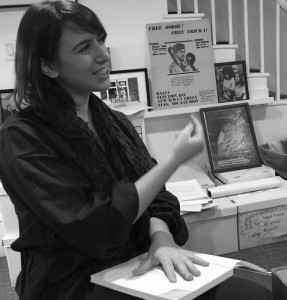

Greece Debt Crisis Postponed, Creditors Back Reform Plans
Earlier this year, we reported on the historic election voting in the Greek anti-austerity party of Syriza, led by Alexis Tsipiras. Syriza’s platform is to take back power within the Greek government, to effectuate a program that will call for cancellation of debt, nationalization of the banks, and expropriating closed factories. Greece is a member of the Eurozone, the nations that have joined with a common currency in 1999. Now, after barely a month in office, the Syriza Party led by Prime Minister Alexis Tsipiras has been forced to make compromises on major issues such as labor reforms and agreeing not to undo privatization plans, to name a few. The crisis began when the European Central Bank said it would reject Greek sovereign bonds as collateral which made Greek banks dependent on Emergency Liquidity Assistance. Last week, Syriza entered negotiations with the EU and ECB and secured a four month extension of its financial rescue.
Nantina Vgontzas:
- Let’s start with December 2009 when the Greek government declared in had sovereign debt of 109 percent, which is something they’ve been covering up the past few years.
- Goldman Sachs was also involved with helping them to cover up those figures.
- We should look at the political economy of the Eurozone constructed in the early 2000s. At the same time in Germany you had wage depression, meaning Germans were getting lower wages so that German exports would become more competitive and the European periphery was used as a dumping post. So they were getting more lending from German banks and that’s how you started getting more debts in Greece.
- The European Union, The European Central Bank and the International Monetary Fund which has played its hand since the 70s in imposing discipline on the countries throughout the developing world and Greece was the first so called advanced country that was starting to enter into this regimen of so called structural reforms that were attached to these bailouts that Greece was recieving to deal with the debt issue.
- Attached to these structural reforms was the termination of collective bargaining agreements, the reduction of minimum wage . . . so you have massive social degradation and at the same time the debt continues to rise.
- So the debt went from 109 percent of the GDP to 175 percent of the GDP.
- So Greece is basically getting loans so it can pay interest on interest starting in the early 2020s and Syriza rightfully identified this as an extended pretend strategy.
- They were the opposition government between 2012 and the end of 2014 and in 2015 they got 35 percent of the vote which wasn’t enough to form a government on its own which is why it had to form a coalition government.
- Everybody knows that Greece can’t pay off its debt til the early 2020s.
- I’ve written a piece in the Jacobin saying that I don’t think Eurozone would take any chances on letting Greece leave the Eurozone because of how helpful it has been to German capital. They’re not willing to take the long term risk, they’re not will to take the short term risk of speculative attacks that would occur on the Eurozone.
- A Greek exit could have produced a domino effect, perhaps Portugal would have left, Italy, you start having big economies like Spain leaving. That kind of domino effect would be unsustainable for the Eurozone to exist.
- There are ways of dealing with this (Greece leaving the Eurozone) You would have to impose capital controls, you would have to nationalize the banks, which is something that the Syriza leadership said that they wouldn’t do prior to elections. They’re going to have to revisit that strategy. Then you would have to figure out how you would ration food, fuel, pharmaceuticals in order to deal with immediate problems. Then you would have to talk about long term policies that would promote growth.
- They (Syriza) cannot move to a technocratic approach because then they would lose thier fundamental element as a left party.
- Half of the police corp (in Greece) support the Golden Dawn. This is something that Syriza has to neutralize while they’re in power.
- They need to be neutralized by promoting a strategy that’s actually going to reverse austerity.
- Jacobin Magazine -Nantina Vgontzas /Financial Times – Wolfgang Munchou
Guest – Nantina Vgontzas, a Greek-American PhD student in sociology at NYU focusing on political economy and social movements. She is a member of the UAW Graduate Student Organizing Committee and is involved in the Academic Workers for a Democratic Union reform movement.
——————————————————–
CIA Sponsored Terror, Civil Liberties, Criminalizing Dissent, Crony Capitalism, Human Rights, Political Prisoner, Prison Industry, Surveillance, Targeting Muslims, Truth to Power
Podcast: Play in new window | Download


City and County of San Francisco v. Sheehan
In early December of 2014, the Supreme court agreed to hear the case City and County of San Francisco v. Sheehan. The case involves San Francisco police officers who reported to a group home to transport Teresa Sheehan, who was known to be mentally ill, to mental health facility. The situation ended with police firing six shots on Sheehan. She survived and filed a lawsuit arguing that officers had a responsibility under federal law to consider her mental disability. The case is not about police criminal liability, this one is about whether police are obligated to take special precautions in using deadly force, and also in entering an individual’s home without a warrant or permission. Read Michael Avery’s observation about details of case.
Attorney Michael Avery:
- Teresa Sheehan is a woman in her mid-fifties who was living in a group home in San Francisco, a home for people with mental disabilities.
- Officers came to the house and ended up shooting her five times at point blank range.
- The case raises some issues for the federal courts in which the lower courts are in disagreement, and the court (Supreme Court) took the case hoping to resolve those disagreements.
- The police came because the social worker had become concerned with Ms Sheehan, and wanted to send her to a hospital for 72 hours of evaluation and requested the assistance of the police in transporting her to the hospital.
- Ms. Sheehan on the other hand didn’t want to be taken to the hospital, didn’t want the social worker in her room, did not want the police in her room, she just wanted to be left alone.
- In the course of asserting her right to be left alone, she threatened the police and the social worker with a knife.
- The police then ended up breaking through her door. Forcing open her door and when she was standing there with the knife, they tried to pepper spray her. That didn’t seem to have much effect on her and so they shot her five times.
- Miraculously she survived but now she’s permanently disabled and disfigured. One of the bullets entered the left side of her temple, shattered her eye socket and then exited through her mouth causing serious injuries to her jaw.
- Officers encounter people with mental disabilities extremely frequently. In large cities and towns in the United States its estimated 1 out every 15 people that the police interact with has some form of mental illness.
- Officers are trained to try to diffuse the incident, not to threaten the person, to ask open ended questions, to listen to what the person has to say, try to establish some rapport with the person, respect the person’s space and not crowd the person, and at the same allow the incident to go on as long as it has to in order to have a peaceful resolution.
- Several years ago I wrote an article called Unreasonable Seizures of Unreasonable People making the point that officers ought to be held to standard that requires them to follow their own training.
- When I saw this case was in the courts, I volunteered to provide some assistance to the lawyers in connection with the brief they were writing.
- There are two claims in the case. One is a claim under the Fourth Amendment of the Bill of Rights, which is the part that says government cannot make unreasonable searches of our home or seizures of our person and the other is a claim under the Americans With Disabilities Act.
- In effect they discriminated against her on the basis of her disability by not following their training and not making the accommodations that they were trained to make for a mentally ill person.
- Secondly, the argument is, when they forced open the door to her apartment and entered and used deadly force against her, they were not behaving reasonably and that again is based on the same idea it would have been reasonable to follow their training. Frankly, they just threw their training out the window.
- Oral argument is scheduled for March 23, 2015.
Guest – Civil rights lawyer Michael Avery, professor at Suffolk University Law School and former president of the National Lawyers Guild from 2003 to 2006. He’s also worked with the National Police Accountability Project.
—-
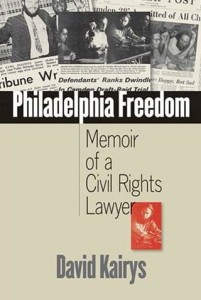
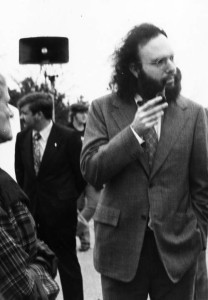
Lawyers You’ll Like: David Kairys
David Kairy began his career at the Philadelphia public defender’s office in the late 1960s. Since then, he’s been a leader in effort to fight discrimination and protect individual rights, now he’s regarded as one of the nation’s preeminent civil rights attorneys. David is a professor at the University of Temple Law School, where he teaches civil rights and constitutional law. He has written several books, including Philadelphia Freedom: Memoir of a Civil Rights Lawyer, which was published last year.
David Kairys:
- We were of a number of young firms dedicated to civil rights and representation of progressive groups.
- The Camden 28, caught in the act of breaking into a Camden, New Jersey draft board and destroying all of the files. This was a Catholic Left action.
- FBI had informant in the group, who the FBI was paying on an hourly rate. The informant supplied the means to make the action happen.
- One hundred FBI agents sat around and waited til they destroyed all the files in the office. Many of the 28 were priests. There were more than 300 draft board raids during Vietnam.
- Father Michael Doyle said when your government is napalming children, the place you should be is in jail.
- Father Doyle and I strategized a way to start talking to the FBI informant Bob Hardy and eventually got an affidavit saying that the FBI manufactured this crime.
- I filed the affidavit and it was on the front page of the New York Times.
Guest – David Kairys, Professor of Law, the first James E. Beasley Chair (2001-07), and one of the nation’s leading civil rights lawyers. He authored Philadelphia Freedom, Memoir of a Civil Rights Lawyer and With Liberty and Justice for Some and co-authored the bestselling progressive critique of the law, The Politics of Law, and authored With Liberty and Justice for Some and over 35 articles and book chapters. His columns have appeared in major periodicals, and he has been profiled in the Chronicle of Higher Education, Wall Street Journal, and Philadelphia Inquirer Sunday Magazine. Kairys’s Public Nuisance Theory.
——————————————————-

Please help support Law and Disorder by clicking on Fractured Atlas graphic. This radio show is now a sponsored project of Fractured Atlas, a non-profit arts service organization. Contributions for the charitable purposes of Law and Disorder must be made payable to Fractured Atlas only and are tax-deductible to the extent permitted by law. You can donate as little as 5.00 a month.
CIA Sponsored Terror, Civil Liberties, Criminalizing Dissent, Crony Capitalism, Habeas Corpus, Human Rights, Political Prisoner, Prison Industry, Supreme Court, Surveillance, Torture
Podcast: Play in new window | Download

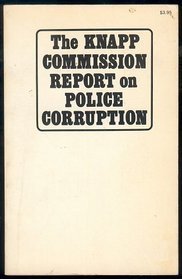
Blood On Their Hands: The Racist History of Police Unions
The NYPD police officer union’s outrageous assertion that New York Mayor Bill de Blasio had “blood on his hands” in the murder of two NYPD officers, is consistent with the reactionary role of police unions across the country. They came to prominence in the wake of the civil rights movement. Police unions have played a powerful role in resisting all manner police reforms and in defending police officers no matter how outrageous and racist their actions. Attorney Flint Taylor brought an analysis of police unions playing a major role in defending cops throughout the last few decades in his article Blood On Their Hands: The Racist History of Police Unions.
Attorney G. Flint Taylor:
- I started to look at this because I had been in battle with the union here in Chicago, the Fraternal Order of Police, since I’ve been a lawyer which is almost 45 years.
- After I saw what was happening in New York, I did some research on New York as well as brought back to memory a lot that had happened here in Chicago.
- In New York I took it all the way back to Mayor Lindsey when he attempted to deal with and bring about a civilian review agency of the police department.
- One of the instances (in New York) police showed their displeasure by running through the black community banging on the tops of garbage cans, waving their guns around and Abe Beame had to get a restraining order to stop them.
- The racism of it all became more apparent under Mayor Dinkins reign in the 90s, when he again revisted the idea of strengthening the civilian review agency.
- Sometimes you find that the union is to the right of the police hierarchy.
- When I put together the article and studied New York over the last 50 years and brought together my understanding here in Chicago, is that they’re so fundamentally racist. They don’t even represent all of the cops.
- They represent the white power structure, the most reactionary aspects of the department.
- Whenever racism is at the heart of police actions, you’ll find the union shoulder to shoulder defending those actions by those cops.
- In Chicago it started around the Democratic National Convention in 1968. The murder of Fred Hampton and Mark Clarke, the Black Panther leaders.
- Of course the FOP became extremely actively involved in defending the indefensible in the Jon Burge police torture cases and has been at the heart of it here in Chicago for 20-30 years in resisting all forms of justice in the Burge torture cases.
- Right after he (Burge) was fired by the police department in the mid-nineties, the union had the temerity to organize a float to honor Burge and the two other officers who were found to have tortured . . . in the St. Patrick’s Day parade.
- The union here again is a white officers union – not only that – the white officers union, it represents the racist interests of a certain click of police officers that patrol the communities of color here in Chicago.
- Until there’s a fundamental change in policing and the justice system, the union is going to have that kind of power and is going to continue to flank on the right, what already a reactionary, military force which is the police department.
- It’s basically universal maybe more so in the big urban areas.
- We have to educate our brothers and sisters in the broader labor unions like the SEIU and the unions that support the correctional officers.
- Police unions reflect police departments, police departments are occupying forces. They were created to put down the working class. They were created to protect the interest of what is now the one percent.
- So, how could they be part of the movement that deals with workers’ rights and fights against racism when that’s what they’re defending?
Guest – G. Flint Taylor, a graduate of Brown University and Northwestern Law School, is a founding partner of the People’s Law Office in Chicago, an office which has been dedicated to litigating civil rights, police violence, government misconduct, and death penalty cases for more than 45 years.
—–
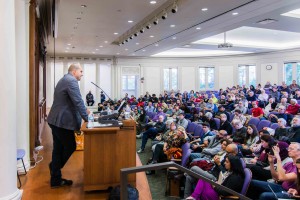
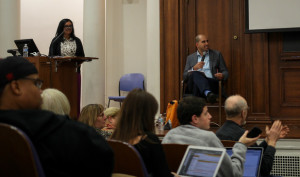
Inter-Nationalism: Encountering Palestine In American Studies
Professor Steven Salaita at age 39 had already written 6 outstanding books. He was a tenured professor at Virginia Tech University. He was offered a job with tenure at the University of Illinois in their American Indian Studies program. He accepted the job, and quit his other job, left his house, his wife did the same, left her job. They were enroute to Illinois for him to start working when he was told by Chancellor Phyllis Wise that he was not going to be hired. He was fired from a tenured job he had been offered at the University of Illinois because of his tweets criticizing Israel’s murderous war on the people of Gaza last summer .
Why? The university was under tremendous pressure as documentary evidence shows by private donors who said, you hire Salaita, we won’t give you money. The university caved. Salaita didn’t get his job. He’s now out of work and he’s about to file or will have filed a lawsuit trying to get his job back and reassert the principles of academic freedom, academic shared government and free speech. We hear a presentation by Steven Salaita titled Inter-Nationalism: Encountering Palestine In American Studies delivered at New York University November 2014.
——————————————————————-

Please help support Law and Disorder by clicking on Fractured Atlas graphic. This radio show is now a sponsored project of Fractured Atlas, a non-profit arts service organization. Contributions for the charitable purposes of Law and Disorder must be made payable to Fractured Atlas only and are tax-deductible to the extent permitted by law. You can donate as little as 5.00 a month.
CIA Sponsored Terror, Civil Liberties, Criminalizing Dissent, Crony Capitalism, Human Rights, NSA Spying, Political Prisoner, Prison Industry, Prosecution of the Bush Administration, Supreme Court, Surveillance, Targeting Muslims, Torture, War Resister
Podcast: Play in new window | Download
Updates
- Chilean Court Finds American Journalist Charles Horman Was Murdered With Help of US Government – CCR Case
- Appeals Court Rules Victims of Torture at Abu Ghraib May Sue Private Military Contractor CACI Al-Shimari v. CACI
- Happy Birthday To Julian Assange From Law and Disorder Hosts
- Hobby Lobby: Continued Attack On Women’s Reproductive Rights
- The Meaning of the Fourth of July For the Negro By Frederick Douglas
——


Federal Court Dismisses All Charges Against Dr. Sami al-Arian
In very good news last week the US Department of Justice dropped all of its criminal charges prosecutions etc of activist and Palestinian professor Sami Al Arian. They’ve been trying to persecute, charge him etc. for over 11 years. The case began in 2003 as a criminal case. Although he was charged with some 14 counts he was convicted of none. Rather than face trial again Al-Arian pled guilty to one count served some time and most of us thought it was over by then. He had an agreement that he couldn’t be further prosecuted, that they wouldn’t go after him any longer but that he could be deported. Unfortunately the Department of Justice had a what you would have to call an Islamophobic vendetta against Sami Al Arian. They went after him again, first with the civil contempt of a grand jury he did time for that and in then something utterly unusual they charged him with criminal contempt. The criminal contempt case was pending for five years finally, last week the Department of Justice, the prosecutors dismissed that case.
Laila Al-Arian:
- We’re feeling a sense of relief that this nightmare appears to be coming to an end.
- We’re happy to hear about the government dismissing the charges against my father.
- In a way it’s vindication for my father, we said in the very beginning. It’s been 11 years. We said all along this is a political case.
- If my father truly were a criminal, they would try their utmost to keep him in prison. Not to say political prisoners aren’t often arrested unjustly, tried and imprisoned but we’re hoping that this finally means this saga will end and my father can live as a free man.
- What preceded it (2003 indictment) was really a decade of harassment. The FBI basically tapping our phone calls, not just my father’s but siblings and I as well. When you think of the Snowden disclosures and the NSA spying on people, for us this is a reality.
- We had no sense of privacy growing up. Simply because my father was a Palestinian activist who dared to challenged the common narrative that you normally hear in the United States.
- Because he really dared to offer a different perspective and to try to help people being subjugated and occupied, so because of that he became a target, not only of the FBI but really powerful pro-Israel voices and forces here in the U.S who tried to smear his name for many many years, accused him of being a terrorist.
- That was part of it, because he was an advocate on Palestinian human rights but also because he was a person who really thought to involve American Muslims politically.
- A lot of these forces I mentioned after 9-11, they really exploited the atmosphere with fear and hysteria and tried to paint my father as this menacing figure, as a terrorist, and at time when the Bush Administration should have been working with American Muslim leaders and try to build a bridge between east and west. Instead the targeted my father and tried to make an example out of him, to say that if you dare to speak out this is what will happen to you.
- He ended up being arrested in 2003 and placed in some of the most atrocious and inhumane conditions that even Amnesty International condemned and was held basically for 2 and a half years before he was basically put on trial.
- The trial lasted for six months, the government spent millions and millions of dollars on the case. They even flew in witnesses from Israel to testify about things my father had nothing to do with.
- After months of negotiations my father signed a plea agreement to end his case once and for all. The government ended up violating the key agreement and basically a prosecutor here in Virginia on ended up at bringing him here and trying to basically retry the Florida case despite the agreement and tried to get him to testify in another case against a Muslim think tank in Virginia and when he refused to testify for the violation of the pre-agreement he was held first on civil contempt and then charged criminal contempt.
- It was very clear that the true intent of this Islamophobic and pro-Israel prosecutor Gordon Kromberg is to retry the Florida case in Virginia, basically pretending it was another case when all of the questions had to do with the Florida case.
- Then the judge received a couple of motions from my father’s attorneys asking to fully dismiss the case and there were no rulings in the past few years by the judge and finally the government decided to drop the charges.
- Luckily in the fall of 2008, my father was released on bail. He was released on house arrest.
- It’s really a testament that there is no case. The think tank that was investigated by Kromberg wasn’t charged for a single crime. They convened one grand jury after another and there were never any charges, any indictment.
- My father was a professor at the University of South Florida, a professor of computer engineering when he was arrested. It’s a very complicated case, as we mentioned stretches over a decade. It’s a case that actually outlasted the Iraq War.
- The next step is in the plea agreement my father unfortunately at the time his back was against the wall, he did end up agreeing to deportation, so now we expect that he will be deported. But as a stateless Palestinian, we don’t know where he’ll be deported.
- My father’s trial attorneys were Bill Moffet and Linda Moreno.
Guest – Laila Al-Arian, a writer and producer for Al Jazeera English. She helped produce the network’s Palestine Papers special in January 2011, a four-day program on the largest diplomatic leak in the history of the Palestinian-Israeli conflict. She is the co-author of Collateral Damage: America’s War Against Iraqi Civilians She is the daughter of Professor Sami Al-Arian.
—–


Supreme Court Delivers Blow to Organized Labor
Last week the United States Supreme Court decided on the case Harris v. Quinn ruling that some government employees didn’t have to pay any fees to the unions representing them. The case was brought by 8 Illinois workers who provided home care to Medicaid recipients. Some of the plaintiffs were mothers who were personal assistants to their disabled children and opposed joining the union. In a 5-4 majority, Justice Samuel Alito Jr.concluded there was type of government employee called a partial public employee who can opt out of joining a union and not be required to pay union fees.
Labor Attorney Bill Herbert:
- Harris versus Quinn I what the ramifications of it while the court held that the majority held that a statute in in Illinois that provided for requiring employees in a bargaining unit to pay agency fee to union was unconstitutional and therefore struck down a provision of a contract that require those employees to pay a fee for being represented by the union.
- These are domestic workers who work for people who are ill and who but also that their salaries and the benefits are paid for by the state.
- These are public employees defined by state law as public employees but it is a background in the National Labor Relations Act which is the Wagner act which was past in 1935 specifically exempts domestic workers in farmworkers from representational rights. These employees if they were just hired by someone to come to their home would not have any rights under the National Labor Relations Act.
- In 1947 Taft-Hartley was passed, Taft-Hartley allows for states to pass laws which are called right to work laws or referred to as right to work laws.
- A state can prohibit a contract to provide that people who decide not to join the union still have to pay a fee related to the representation.
- For public employees there was a case decided in 1977 called Abood which came out of Detroit. In 1977 case public employees it was found constitutional to establish a procedure where people were not members of the public sector union still have to pay a fee for the representational rights that’s negotiations etc. but don’t have to pay for what is sometimes is ideological work which would be in a political activity such as supporting candidates etc.
- There was a procedure created where people can object and they can go in and raise issues and seek to have only monies relevant to collective-bargaining be a part of their fee, so that was Abood.
- The heart of wages and benefits are something that are set by the state. It’s called joint employer relationship.
- The court in the Harris v. Quinn case ruled that its unconstitutional for these employees to be required to pay a fee for the benefits they received based on the representation provided by the union.
- It’s interesting to compare this to Citizens United. In Citizens United, shareholders who are opposed to what a corporation may spend in terms of money for political action in terms of supporting candidates, had no say.
- The Supreme Court found that in Citizens United the First Amendment gives corporations First Amendment rights and the share holders have no say.
- In this case the Supreme Court held that these employees don’t have to pay anything for being represented by the union in collective bargaining for the state.
- Domestic workers are usually low wage employees, very high turn over, people who are generally receiving the low end of the pay scale.
- What we’re looking at is constitutionalizing this concept which was previously statutory in the private sector and making it such that other statues around the country where states have intervened in providing for representational rights for people excluded from the National Labor Relations Act.
- These other statutes may now be challenged based on this ground and in the future it’s based on language of the decision. It’s conceivable that this case could at least the verbiage in the majority decision which Justice Kagan referred to is good to as gratuitous dicta about Abood decision and why was wrongfully decided is something then they come back to be utilized in future cases in future challenges against the requiring union members of bargaining you do not union members to pay a fee.
- In Illinois and in other states domestic workers have been working in the doing a lot of work towards organizing to provide the collective bargaining but for example in New York they don’t have the right to collectively bargain nor farmworkers in other states both farmworkers and domestic workers have rights to unionize.
- These kind of this decision where depending on the structure that the state’s designs could be subject to build the other statues they subject to challenge legally.
- One of the ironies in this case is that one of the reasons why these agency fee arrangements have been states have put them into place is to create stability within bargaining is not having multiple unions trying to come in and and try to organize employees or having conflicts between members who are paying for the services against people who are not paying so the legislatures when they pass in Illinois for example they when they passed the statute were seeking to provide stability in the workplace. Most “Right to Work” states are in the South.
- The current time is being described as the new Gilded Age and new Gilded Age is about wage disparity but is also other things including job security and issues involving the pensions.
- Tenure is under attack pensions are under attack and now there’s an attack upon the idea of having to pay representative to provide you with with representation. A lot of the initiatives that have been enacted in the 20th century are being stripped away and it’s being tied with basically the new Gilded Age.
- The good news of the decision was that Abood was not overturned.
Guest – William A. Herbert is a Distinguished Lecturer at Hunter College, City University of New York and a former Deputy Chair and Counsel to the New York State Public Employment Relations Board (PERB). Prior to his tenure at PERB, Bill practiced labor and employment law in federal and state courts, administrative agencies and in arbitration. Bill is one of the editors of the treatise Public Sector Labor and Employment Law, Third Edition and he has written and spoken extensively on public sector labor law and history.
——————————————————
CIA Sponsored Terror, Civil Liberties, Criminalizing Dissent, Crony Capitalism, FBI Intrusion, Guantanamo, Human Rights, NSA Spying, Political Prisoner, Prison Industry, Surveillance, Torture
Podcast: Play in new window | Download
Updates:
—-
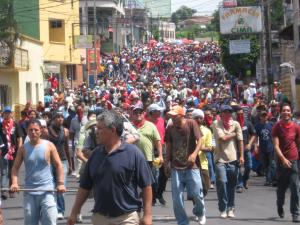

The Drug War: Policing and U.S. Militarism at Home and Abroad
Last week the Center for Constitutional Rights hosted an event titled The Drug War: Policing and U.S. Militarism at Home and Abroad. We’re joined by one of the panelists David Vivar, he’s an author and scholar at National Autonomous University of Honduras at the Faculty of Political Science and International Relations of the University of Calabria. His work focuses on the U.S. cooperation in the Honduran military coup of 2009 and the centrality of drug trafficking to state power in Honduras. What you will hear in this interview is that the U.S. Drug War has not only fueled mass incarceration and discriminatory policing practices here in the U.S. but also supports violence and militarization throughout Latin America. We get the details of that and David’s strategies to resist the racist, and devastating war.
David Vivar:
- It’s been constant that Congress asks to stop human rights violations.
- This goes all the way back to the simulation of the rule of law, to a democratic state.
- We have the highest murder rate in the whole world, and we have no war, not a consistent war declared except the war on drugs.
- We’re fighting a war that has turned the current conditions into a civil war.
- When you start having conflicts between drug lords, Mexican cartels and Colombian cartels – what do they do? They go to the space right in the middle, which is Central America and the northern triangle.
- Guatemala, Honduras and El Salvador have seen the consequences. We are the collateral damage.
- 79 percent of the cocaine that travels to the United States goes via Honduras. Basically what the Department of State is doing is investing money on kingpins and drug lords in the Honduran institutions.
- After the coup the military took back power and the U.S constantly supported this new democratic military civil alliance, which in the hand is what happened in Mexico.
- The (Honduran) military has drug lords of its own.
- Miguel Facusse is the most powerful man in Honduras. He’s got the Dinan Corporation which has African Palm plantations throughout the whole drug path.
- Basically the conflict around land is a failed agrarian reform.
- You have indigenous populations that lost their land. Their land was given to this man. The most powerful person, he gets the African Palm plantations which is the best place, as we know from wikileaks to establish small airports for aircraft to land there and deal with the drugs.
- The resistance is still in the streets against a lot of laws – the opening for business of the country – model cities and charter cities are something we’re fighting back in keeping our resources ours.
Laura Raymond:
- The U.S. did cut off military aid for a short amount of time directly after the coup but instead of backing the movement from the Honduran civil society for reinstatement of President Zelaya – throughout that summer and fall there was a huge movement, the streets were filled with people calling for the reinstatement of their president – the United States instead pushed for new elections that fall which was what ended up happening.
- The elections were heavily boycotted by civil society yet the U.S. was the primary force in the region for supporting those elections.
- After those elections took place and Pepe Lobo is elected as president, the U.S. reinstated their support for the Honduran military and police, despite massive human rights violations that were taking place on an almost daily basis.
- You really have a very close relationship between the Honduran military and police and the U.S. government and military.
- There have known to be drug planes that have landed on his property (Miguel Facusse) We know that the U.S.State Department knows about that because of wikileaks and the U.S. goes on to have this cozy relationship with him and the political arm of Honduras that he runs in.
- The World Bank continues to fund him and give him subsidies for the African Palm plantations. Where is the interest in stopping the drugs if you’re working with this person who there are drug planes landing on his property.
- He has a private army basically. He has all these private security contractors that implicated in murders. The Center for Constitutional Rights has laid those out in a report to the International Criminal Court, naming Miguel Facusse as a criminal that needs to be prosecuted.
- The U.S. depends on the Honduran government to have a very friendly government in the region. We have a lot of military presence there, we have a lot of bases. It’s a relationship that depends on the repression of civil society throughout Honduras.
- There’s a massive resistance movement that has taken a lot of repression in the last four years. What’s going on with the drug wars, its very dark and scary but the other side is this movement that David is part of.
Guest – David Vivar, is a sociologist, currently a scholarship holder from the National Autonomous University of Honduras at the Faculty of Political Science and International Relations of the University of Calabria, where he studies dependence, international asymmetry and the division between center and periphery nations. His articles and essays analyze media discourse and public opinion; the representative intermediations of Honduran democracy, the influence of U.S. cooperation in the military coup of 2009 and the centrality of drug trafficking to state power in Honduras and its inextricable relation with the neoliberal impoverishment and the ongoing usurpation of democracy.
Guest – Laura Raymond, has over fourteen years of experience organizing, writing, and advocating on social justice and human rights issues in the U.S. and internationally. Much of Laura’s work focuses on the impact of U.S. actors, corporations and government policies and practices abroad.
—–
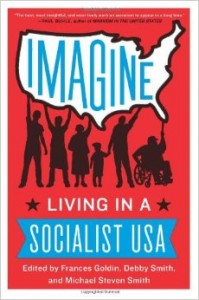
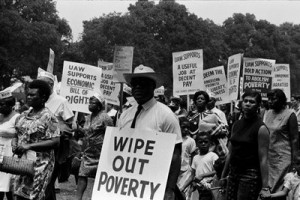
Imagine: Living In A Socialist U.S.A – Kazembe Balagune
In the past weeks we’ve featured contributors to the book Imagine: Living In A Socialist U.S.A. This book as many know was conceived and edited by Frances Goldin and our own Michael Smith with his wife Debby. We continue to discuss the essays in this ground breaking anthology. Today we speak with Kazembe Balagun, who wrote We Be Reading Marx Where We From: Socialism and the Black Freedom Struggle.
Kazembe Balagun:
- The chapter starts out with a short story on Paul Robeson at the Carnegie Hall in 1957. He sang a song called I Dreamed of Joe Hill last night.
- When we talk about Wall Street, the first commodity were Black slaves. The reason they called it Wall Street is to keep the Native Americans out.
- There’s always been an interweaving of Black freedom struggles in the socialist experience.
- One of the first socialist experiments happens in the Sea Islands of South Carolina and Georgia where General Butler issuing Article 15 calling for all land held in common for negros.
- Then you have John Brown issuing an alternative constitution of the United States which calls for all land to be held in common between blacks and whites.
- Martin Luther King Jr (in a speech said) there has to be some form of socialism in the United States in order to achieve economic democracy.
- The Poor People’s march going forward in 1968 in his fight for Memphis, these are all parallels for economic democracy.
- What we find today is that these socialist ideas are prevalent in the African-American community.
- I think there’s a way we can excavate this history for our own social movement.
- This capitalist society really has little to offer people, particularly young people of color.
- I always take into account is that there’s always been a tradition of African-American prophetic tradition which always looks beyond what’s been given to us and looks at the condition of possibility.
Guest – Kazembe Balagun, an activist and cultural organizer from the Bronx and former program director at the Brecht Forum. He is currently the project manager at the Rosa Luxemburg New York Foundation.
———————————————————






















